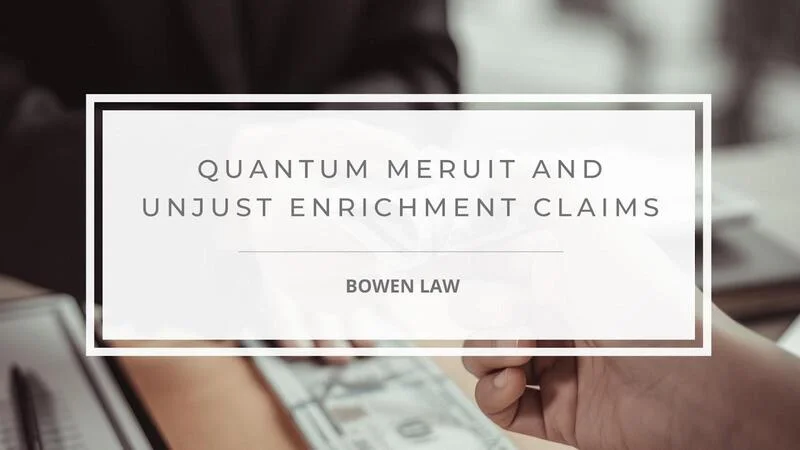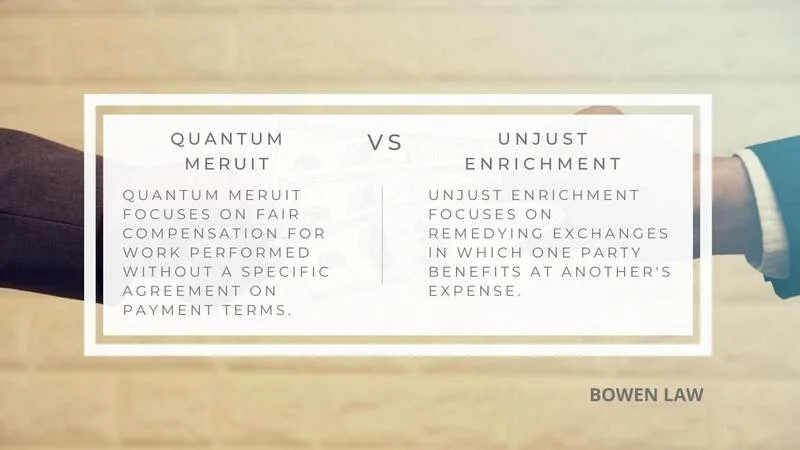When comparing quantum meruit vs. unjust enrichment claims, it’s important to understand the differences in intent and elements. A quantum meruit claim is the recovery of the fair value or sum due for services provided without a price agreement. In contrast, an unjust enrichment claim focuses on the recipient’s unfair benefits.
An unjust enrichment claim seeks to resolve agreements in which one party profits at the expense of another. Meanwhile, quantum meruit is about getting a fair price for services. Hence, on many occasions, a quantum meruit is used to prevent unjust enrichment.
Quantum Meruit Claims
What is quantum meruit? A quantum meruit is a legal claim when a party demands reasonable compensation for a service rendered. It’s filed when both parties have not agreed upon the value or cost of service, to which then the court will determine the fair market value of the services.
Generally, a quantum meruit claim can protect both the worker and the recipient of the service. For the worker, a quantum meruit claim sets the reasonable value for their services. Additionally, it protects the recipient from paying more than the fair market value of the services.
When Can You File for a Quantum Meruit Claim?
You may file a quantum meruit claim when:
- Both parties agree to a “quasi-contract” or an implied agreement or contract.
- If both parties agree that compensation is to be made for the service, but with no specific amount.
- The defendant benefited from the service.
- The service was rendered even if the contract was terminated, void, or otherwise unenforceable because of events like fraud or death.
How to Prove Quantum Meruit Claims
To ensure the success of your quantum meruit claim, you need to prove 4 essential elements:
Services were valuable
Your responsibility as the plaintiff is to demonstrate the worth and benefit of the service provided. The service’s overall quality and commercial value are considered for the court to determine a “reasonable” sum. Additionally, you must also show that the defendant requested the services.
Services were rendered
You must provide evidence that you partially or fully performed the agreed-upon services. If you worked under a contract that was later deemed void or unenforceable, a quantum meruit claim could assist in determining the reasonable amount for the services you provided.
Unjust enrichment
It would be unfair to refuse to pay the plaintiff a fair price for those services if the defendant benefited from and enjoyed them.
Agreement that services are not free
While there’s no agreed amount for the service, it’s clear that both parties expected compensation. Both parties have agreed that the service is not a gift. The element of choice is present, and the defendant chose to pay.
Unjust Enrichment
What is unjust enrichment? It happens when one party receives benefits at the expense of another, which the law considers “unjust.” An unjust enrichment claim is a civil lawsuit made to seek restitution or remedy for the defendant’s unjust benefits.
A simple example of an unjust enrichment claim is when a homeowner refuses to pay a gardener for the services because they didn’t sign a contract. The gardener may seek compensation under the elements and purpose of unjust enrichment claims.
When Can You File for an Unjust Enrichment Claim?
The grounds for filing unjust enrichment claims are almost the same as quantum meruit. Ultimately, the guiding principle of an unjust enrichment claim is fairness, and no one should take advantage of someone else’s services for personal gain.
How to Prove Unjust Enrichment Claims
The 3 elements of a successful unjust enrichment claim are:
Defendant received benefit
The court may ask: “Has the defendant received enriched?” The plaintiff must establish that the defendant benefited directly from the services and took advantage of them. In the case of the homeowner and the gardener, the homeowner enjoys the beautiful garden.
Plaintiff’s expense
Was the enrichment made at the plaintiff’s expense? It’s crucial to prove that the plaintiff’s labor led to the defendant’s joy. The facts of the case should demonstrate that the plaintiff put in a lot of effort and hard work to provide the service.
Unjust
Was the enrichment unjust? Under Michigan law, it’s critical to establish that the defendant’s continued use of the services while not paying for them is unfair and unjustifiable. This element can be tricky, especially if a breach of contract or agreement is involved.
Muskegon Construction Attorney That Can Help You
If you’re interested in filing a quantum meruit or an unjust enrichment claim, you need an expert construction attorney. At Bowen Law, we have the right Muskegon construction attorney for you. Our legal experts will simplify the complicated process for you. Reach us at (231) 726-4484 for an appointment.


